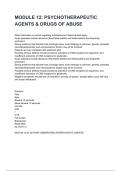MODULE 12: PSYCHOTHERAPEUTIC
AGENTS & DRUGS OF ABUSE
What information is correct regarding schizophrenia? Select all that apply.
Acute episodes include delusions (fixed false beliefs) and hallucinations are frequently
prominent.
Strong evidence that disorder has a biologic basis, exact etiology is unknown: genetic, perinatal,
neurodevelopmental, and neuroanatomic factors may all be involved
Patients are very compliant with treatment plan
Possible primary defects include excessive activation of CNS receptors for dopamine, and
insufficient activation of CNS receptors for glutamate.
Acute episodes include delusions (fixed false beliefs) and hallucinations are frequently
prominent.
Strong evidence that disorder has a biologic basis, exact etiology is unknown: genetic, perinatal,
neurodevelopmental, and neuroanatomic factors may all be involved.
Possible primary defects include excessive activation of CNS receptors for dopamine, and
insufficient activation of CNS receptors for glutamate.
Negative symptoms include lack of motivation, poverty of speech, blunted affect, poor self-care,
and social withdrawal.
Previous
Play
Next
Rewind 10 seconds
Move forward 10 seconds
Unmute
0:00
/
0:15
Full screen
Brainpower
Read More
ACTIVITY 2
NSG124.12.01.02 FIRST-GENERATION ANTIPSYCHOTIC AGENTS
, The nurse is preparing to administer a first-generation antipsychotic to a patient. The nurse
knows which of the following are correct? Select all that apply.
Significant adverse effects of extrapyramidal symptoms (EPS) including acute dystonia,
parkinsonism, and akathisia - tardive dyskinesia
Death by overdose is extremely common
Drugs block receptors for dopamine, acetylcholine, histamine, and norepinephrine
Neuroleptic malignant syndrome (NMS) risk
Significant adverse effects of extrapyramidal symptoms (EPS) including acute dystonia,
parkinsonism, and akathisia - tardive dyskinesia
Drugs block receptors for dopamine, acetylcholine, histamine, and norepinephrine
Neuroleptic malignant syndrome (NMS) risk
Positive symptoms (e.g., delusions, hallucinations) may respond somewhat better than negative
symptoms.
blockades at receptors are responsible for the major adverse effects of the antipsychotics
ACTIVITY 3
NSG124.12.01.03 FIRST-GENERATION ANTIPSYCHOTIC NURSING CONSIDERATIONS
The nurse is preparing to administer a first generation antipsychotic to a patient. The nurse
knows which of the following nursing implications are correct? Select all that apply.
Inform patients and their families about early EPS symptoms (e.g., muscle spasm of tongue,
face, neck, or back; tremor; rigidity; restless movement), and instruct them to notify the
prescriber if these appear.
Inform patients about signs of hypotension (light-headedness, dizziness) and advise them to sit
or lie down if these occur. Inform patients that hypotension can be minimized by moving slowly
when standing up.
Instruct patients that drugs are highly addictive.
Inform patients and their families about early signs (e.g., fine, worm-like movements of the
tongue), and instruct them to notify the prescriber if these develop.
Inform patients and their families about early EPS symptoms (e.g., muscle spasm of tongue,
face, neck, or back; tremor; rigidity; restless movement), and instruct them to notify the
prescriber if these appear.
Inform patients about signs of hypotension (light-headedness, dizziness) and advise them to sit
or lie down if these occur. Inform patients that hypotension can be minimized by moving slowly
when standing up.
Inform patients and their families about early signs (e.g., fine, worm-like movements of the
tongue), and instruct them to notify the prescriber if these develop.
Inform patients about early signs of infection (fever, sore throat), and instruct them to notify the
prescriber if these develop.




